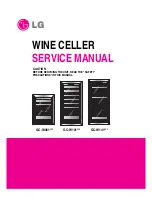
27
the weight of the bottles. The inclination also guarantees the proper evacuation of
condensation water and the proper sealing of the door seal.
▪
Adequate ventilation is required, do not block the front air outlet.
This wine cellar is designed for free-standing,
in no case it must be installed in a
built-in or embeddable way.
For a good functionality of the device it is imperative
to leave a good air circulation all around the device. We do not take responsibility for
failure to comply with the installation instructions.
▪
Connect the appliance to a single socket, leaving enough space for ventilation
around the appliance
.
Be careful to support it, so that your wine cellar is perfectly level
(use of a spirit level is recommended). This will prevent any movement due to instability,
causing noise and vibration, and will ensure that the door seals perfectly.
▪
This appliance is intended to be used exclusively for the storage of wine.
▪
This appliance is using flammability refrigerant. So never damage the cooling pipe work
during the transportation.
Caution
▪
Store wine in sealed bottles.
▪
Do not overload the cabinet.
▪
Do not open the door unless necessary.
▪
Do not cover shelves with aluminum foil or any other shelf material which may prevent air
circulation.
▪
Should the wine cooler be left empty for long periods it is suggested that the appliance is
unplugged, and after careful cleaning, leave the door ajar to allow air to circulate inside the
cabinet in order to avoid possible condensation, mold or odors forming.
CAUTION: please keep the appliance away from substance, which can cause ignition.
This refrigerating appliance is not intended to be used as a built-in appliance.
This appliance is intended exclusively for the storage of wine
To ensure sufficient ventilation of the appliance, keep a minimum distance of 15 cm between
the walls of your wine cellar and nearby walls (walls or worktop for example) as shown in the
illustration below. .
Summary of Contents for CTPNE147
Page 90: ...89...
















































